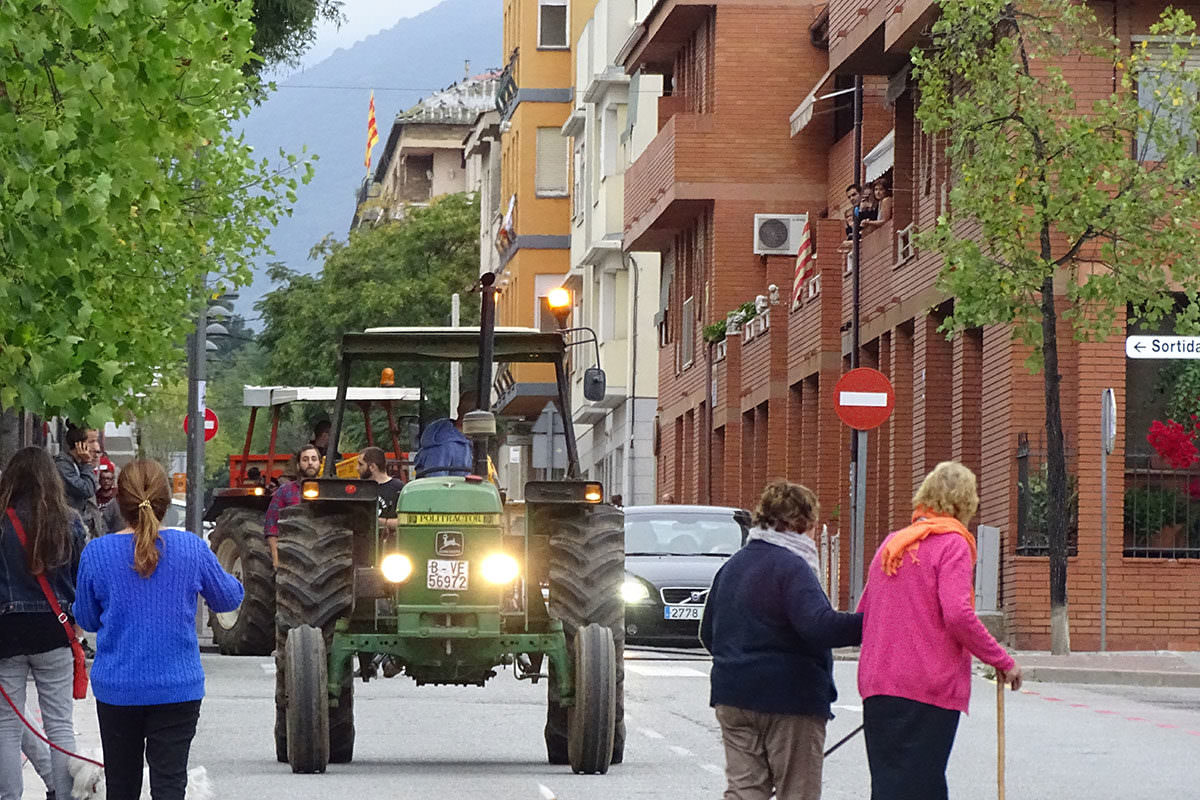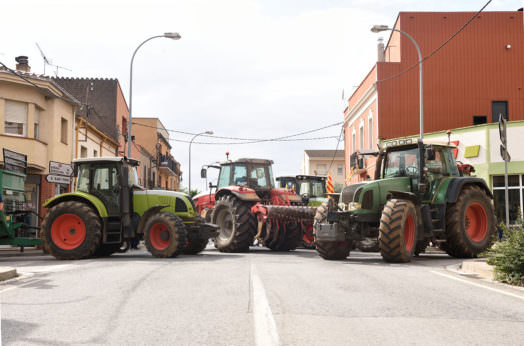Lacking tanks, John Deeres are a worthy substitute in times of civil unrest.

Two days before the October 1st vote to determine whether Catalonia should remain part of Spain (a vote that the Spanish government considered illegitimate), an estimated 700 tractors crept into Barcelona, joining a giant parade in solidarity with the independence movement. Assemblea Pagesa, a local farmer’s union, had put out the request: “We ask for all the tractors in the land to be parked in the vicinity of polling stations without hindering traffic or the carrying out of the vote… but ready to move against any potential sabotage of the ballot.”
The role of farmers in the Catalan resistance is explained simply by the importance of agriculture in their society.
The plan was to position the tractors to be used as a blockade against police who had been sent to prevent the vote from taking place. Heeding the call, Catalan farmers acted as a de facto militia – albeit unarmed – their tractors serving as impromptu podiums for young separatists who climbed atop to shout their demands. At a nearby port, farmers reportedly formed a tractor blockade to prevent riot police from disembarking a ship. And throughout the rural interior of the region, “tractoradas” could be seen blocking roads in protest during the tumultuous week following the vote.
“We will break the chains with the sickles,” said one farmer who was interviewed by The Times, referencing a line from the Catalan anthem, Els Segadors, which translates as “The Reapers.”
The song originates from the Reapers War, also known as the Catalan Revolt, a mid-17th century conflict in which the peasants of this heavily agricultural region fought, unsuccessfully, to overthrow the rule of the Spanish crown. Els Segadors is symbolic of the traditional Catalan identity: fiercely proud people of the land, with a strong populist streak.
“Sharpen your sickle! Sharpen your sickle!” the song proclaims. “Just as we cut golden ears of wheat, when the time calls we cut off our chains.”

Tractors blocking a road in Catalonia on October 3, 2017, in the village of Bascara in Girona. PHOTO:
Josep Curto / Shutterstock.com
A Rich Agricultural History
To an extent, the central role of farmers in the Catalan resistance movement is explained simply by the importance of agriculture in Catalan society. Historically, wine, almonds, and olive oil were prized exports, known throughout Europe and abroad. These traditional crops persist today, though production of swine and tree fruits, especially peaches and nectarines, have come to dominate the rural economy. One-third of Catalonia’s landscape is devoted to farms, a hefty percent given the mountainous nature of the area. Compared to the rest of Spain, the economic value of Catalonia’s farms is 80 percent larger.
Another likely reason that Catalonia’s rural areas are a bastion of populist resistance is that they are a bastion of traditional Catalan culture. In Barcelona and other Catalan cities, Spanish is widely spoken, but in the countryside, the various Catalan dialects dominate (Catalan is an ancient language that sounds like a mixture of French and Spanish). The Spanish dictator Francisco Franco effectively banned the language beginning in the 1930s, which was not reversed until 1979. While many affluent urbanites and recent immigrants in Barcelona may see these struggles as something of the past, for rural communities they remain a cause célÁ¨bre.
And A Rich History of Agriculture + Politics
Thus, Catalan farmers are no strangers to political activism. In 2011, a group of pear and apple farmers staged a protest at the French border over a disagreement with their counterparts on the other side of the Pyrenees. Earlier this summer, Catalan peach farmers rode their tractors on a 112-mile “march” to Barcelona in protest of EU agriculture policies that threaten their livelihood, an event that ended with truckloads of rotten fruit being deposited in the streets and eggs hurled at government office buildings.
There is a long history of farmers elsewhere driving into cities atop dusty tractors to make a statement – a “tractorcade” 900-strong descended on Washington D.C. in 1979 – but elsewhere, their ire is usually aimed at agricultural policy, not national politics. But in Catalonia, the two seem to go hand-in-hand.
“This is strangling agriculture, making the farmer poorer and poorer,” said one Catalan farmer to The Washington Post last week, complaining that a disproportionate percentage of subsidy dollars go are doled out to farmers in other parts of Spain. Another Catalan farmer interviewed by The Post, whose family has farmed in the region for ten generations, had this to add about the prospects for farmers should independence be achieved: “Look, the politicians will keep stealing from us, that’s a given, but maybe our own politicians will steal a little less.” Apparently, that’s a lesser evil worth fighting for.